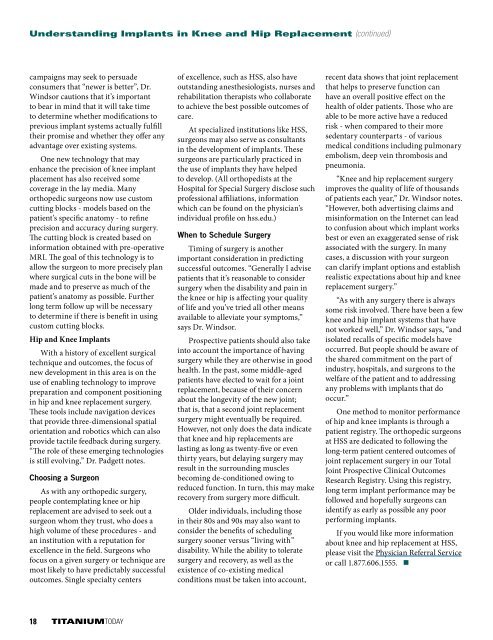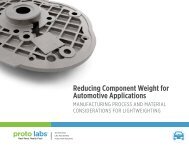100% Positive Material Identification
23mhiW2
23mhiW2
Create successful ePaper yourself
Turn your PDF publications into a flip-book with our unique Google optimized e-Paper software.
Understanding Implants in Knee and Hip Replacement (continued)<br />
campaigns may seek to persuade<br />
consumers that “newer is better”, Dr.<br />
Windsor cautions that it’s important<br />
to bear in mind that it will take time<br />
to determine whether modifications to<br />
previous implant systems actually fulfill<br />
their promise and whether they offer any<br />
advantage over existing systems.<br />
One new technology that may<br />
enhance the precision of knee implant<br />
placement has also received some<br />
coverage in the lay media. Many<br />
orthopedic surgeons now use custom<br />
cutting blocks - models based on the<br />
patient’s specific anatomy - to refine<br />
precision and accuracy during surgery.<br />
The cutting block is created based on<br />
information obtained with pre-operative<br />
MRI. The goal of this technology is to<br />
allow the surgeon to more precisely plan<br />
where surgical cuts in the bone will be<br />
made and to preserve as much of the<br />
patient’s anatomy as possible. Further<br />
long term follow up will be necessary<br />
to determine if there is benefit in using<br />
custom cutting blocks.<br />
Hip and Knee Implants<br />
With a history of excellent surgical<br />
technique and outcomes, the focus of<br />
new development in this area is on the<br />
use of enabling technology to improve<br />
preparation and component positioning<br />
in hip and knee replacement surgery.<br />
These tools include navigation devices<br />
that provide three-dimensional spatial<br />
orientation and robotics which can also<br />
provide tactile feedback during surgery.<br />
“The role of these emerging technologies<br />
is still evolving,” Dr. Padgett notes.<br />
Choosing a Surgeon<br />
As with any orthopedic surgery,<br />
people contemplating knee or hip<br />
replacement are advised to seek out a<br />
surgeon whom they trust, who does a<br />
high volume of these procedures - and<br />
an institution with a reputation for<br />
excellence in the field. Surgeons who<br />
focus on a given surgery or technique are<br />
most likely to have predictably successful<br />
outcomes. Single specialty centers<br />
of excellence, such as HSS, also have<br />
outstanding anesthesiologists, nurses and<br />
rehabilitation therapists who collaborate<br />
to achieve the best possible outcomes of<br />
care.<br />
At specialized institutions like HSS,<br />
surgeons may also serve as consultants<br />
in the development of implants. These<br />
surgeons are particularly practiced in<br />
the use of implants they have helped<br />
to develop. (All orthopedists at the<br />
Hospital for Special Surgery disclose such<br />
professional affiliations, information<br />
which can be found on the physician’s<br />
individual profile on hss.edu.)<br />
When to Schedule Surgery<br />
Timing of surgery is another<br />
important consideration in predicting<br />
successful outcomes. “Generally I advise<br />
patients that it’s reasonable to consider<br />
surgery when the disability and pain in<br />
the knee or hip is affecting your quality<br />
of life and you’ve tried all other means<br />
available to alleviate your symptoms,”<br />
says Dr. Windsor.<br />
Prospective patients should also take<br />
into account the importance of having<br />
surgery while they are otherwise in good<br />
health. In the past, some middle-aged<br />
patients have elected to wait for a joint<br />
replacement, because of their concern<br />
about the longevity of the new joint;<br />
that is, that a second joint replacement<br />
surgery might eventually be required.<br />
However, not only does the data indicate<br />
that knee and hip replacements are<br />
lasting as long as twenty-five or even<br />
thirty years, but delaying surgery may<br />
result in the surrounding muscles<br />
becoming de-conditioned owing to<br />
reduced function. In turn, this may make<br />
recovery from surgery more difficult.<br />
Older individuals, including those<br />
in their 80s and 90s may also want to<br />
consider the benefits of scheduling<br />
surgery sooner versus “living with”<br />
disability. While the ability to tolerate<br />
surgery and recovery, as well as the<br />
existence of co-existing medical<br />
conditions must be taken into account,<br />
recent data shows that joint replacement<br />
that helps to preserve function can<br />
have an overall positive effect on the<br />
health of older patients. Those who are<br />
able to be more active have a reduced<br />
risk - when compared to their more<br />
sedentary counterparts - of various<br />
medical conditions including pulmonary<br />
embolism, deep vein thrombosis and<br />
pneumonia.<br />
“Knee and hip replacement surgery<br />
improves the quality of life of thousands<br />
of patients each year,” Dr. Windsor notes.<br />
“However, both advertising claims and<br />
misinformation on the Internet can lead<br />
to confusion about which implant works<br />
best or even an exaggerated sense of risk<br />
associated with the surgery. In many<br />
cases, a discussion with your surgeon<br />
can clarify implant options and establish<br />
realistic expectations about hip and knee<br />
replacement surgery.”<br />
“As with any surgery there is always<br />
some risk involved. There have been a few<br />
knee and hip implant systems that have<br />
not worked well,” Dr. Windsor says, “and<br />
isolated recalls of specific models have<br />
occurred. But people should be aware of<br />
the shared commitment on the part of<br />
industry, hospitals, and surgeons to the<br />
welfare of the patient and to addressing<br />
any problems with implants that do<br />
occur.”<br />
One method to monitor performance<br />
of hip and knee implants is through a<br />
patient registry. The orthopedic surgeons<br />
at HSS are dedicated to following the<br />
long-term patient centered outcomes of<br />
joint replacement surgery in our Total<br />
Joint Prospective Clinical Outcomes<br />
Research Registry. Using this registry,<br />
long term implant performance may be<br />
followed and hopefully surgeons can<br />
identify as early as possible any poor<br />
performing implants.<br />
If you would like more information<br />
about knee and hip replacement at HSS,<br />
please visit the Physician Referral Service<br />
or call 1.877.606.1555. •<br />
18 TITANIUMTODAY







